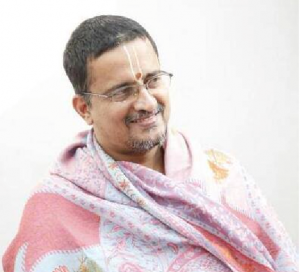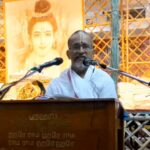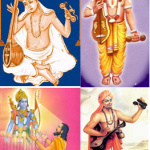It was late evening on an Ekadasi. After Sri Swamiji sang a lovely song describing the divine sport of our Thakurji in Brindavan, Swamiji sat down in his seat in Bhagavatha Bhavanam of Madhurapuri Ashram. As Sri Swamiji gracefully signaled with his eyes for us to come closer, the dozen fortunate ones in the hall came close and sat around Sri Swamiji. Sri Swamiji looked at a devotee and asked if that devotee had any questions. ‘How to progress in the Krishna bhakti rasa?’ asked the devotee with tremendous eagerness and humility. Sri Swamiji with a smile on his lips started to expound the intricacies of rasa (relish) in the next 60 minutes.

“I have two phrases for you to mull on,” began our beloved Master, “Bhakti sukham (the joy of divine love)… and Bhakti prayojanam (the result/fruit out of devotion)…
“Let us start with a simple mundane routine activity all humans do, like bathing
for example. All do that daily… I hope… (Laughter).
If the person has a nice spacious comfortable fragrant bathroom, and the water is warm and pleasing, the person would like to bathe for a long time as (s)he finds this very pleasing. In fact the person may feel a little sad when this pleasing bath gets over to carry on with other chores of the day!
But in the same token, if it were a cold water bath in a small bathroom, all the
person would want would be to be quickly done with the bath so that (s)he can
finish the activity off for the result of being clean. The final result alone would
matter.
Now let us move to our clothing. We need clothes only to cover our body. Yet,
we find many of us want to adorn ourselves with a lovely dress, specially designed at times by a fashion designer, right colours and so on… In fact I think
many of them wear clothes so that they can feel happy and make others feel
jealous, making them feeling happier! (Laughter)
The same trend we can see in our food as well. We need food for our
nourishment alone, right? But we want our food to be tasty and served in
varieties of cutlery! And served by people well-dressed!
The house we stay… we want to it be palatial, tastefully decorated with even
assistance from interior decorators!
When it comes to work, most of us complain, fret and fume… ‘None
appreciates me!’ ‘I am not compensated enough!!’ ‘I have to do most of the
work at home!’ etc.
Now that you see both these scenarios, let me now bring you to Bhakti…When we listen to some music or watch our favourite sport event or a movie,
do we fret or complain, ‘Oh how long do I need to watch this movie!’ or ‘It is
very painful that I am listening to my favourite music!’ or ‘No one shares this
activity of watching my favourite sport event’? Is there any extrinsic motivation for these activities? Do we ask ourselves, ‘What would I get if I listen to this music or that movie?’ Do we get any reward for these, like promotion or pay hike or well… Vaikuntam!? But if we say that for anything we do there needs to be some motivation, what motivation is
there for these activities? When people tell us, we are not motivated to chant
Mahamantra, etc. and they sing cinema songs or watch movies, what is the
motivation for these?! Nothing!
If we do any activity out of an expectation of a reward – tangible like money
and reward, or intangible like recognition and appreciation, it will always be
painful; it can never be enjoyable.
When we are in the path of divine love, even before we start if we start asking what result do we get out of bhakti etc., it is like getting into an interview for our first job and asking the boss at the very outset, ‘What salary and other benefits I would get if I get the job!’
Whenever we do Bhakti it should not be goaded solely by an extrinsic motivating factor like what would I get out of this, what is the result I can expect from bhakti etc. It should also not be motivated by pride that ‘I am following this path’, ‘I am passionate about work’ etc.
In a high-stakes cricket match, the players get the money, the organizers may get money, the people supporting the event may get money, but the fans who come watch actually pay money to watch this! If you understand this, you can understand the fragrance of divine love!
The bhakti itself gives the devotee joy in itself.
‘When you do Bhagavatha parayanam what do you get out of it?’
‘Oh I feel so joyous doing it…’
This is the real fragrance of divine love
‘When you listen to Krishna katha, what is the use?’
‘Oh I feel very joyful merely listening to Krishna katha!!’
This is the real fragrance of divine love.
‘When I bathe my divine couple, it gives me great joy…’
This is the real fragrance of divine love.
‘You dress up your Radha Krishna Yugala Sarkar so elaborately! Why?’
‘Oh this tasteful decoration of my Yugal Sarkar itself is true joy to me!’
This is the real fragrance of divine love.
‘When I do archana, I feel so happy!’
This is the real fragrance of divine love.
In all these cases there is no question of expecting a result of an action. This is Bhakti Sugandham.
While blissfully engaged in such devotional service, a devotee would not even be conscious that he or she is doing it without expectation of an extrinsic result! For example, when someone is relishing a favourite music album, (s)he does not keep thinking, ‘I am not listening to this for any other result!’ and so on… Like we relish varieties of tasty food, like we enjoy living in a palatial lovely house, like we wear very fashionable designer clothes, we also relish the path of divine love as we are endowed with a fine taste and we are a rasika (connoisseur).
Now listen carefully. Even though you relish eating tasty varieties of food or
wear expensive tasteful designer label clothes etc., it does fulfill the basic
purpose of body nourishment or body protection also, doesn’t it?
Likewise even though we relish the path of divine love for its intrinsic joy, it
does also serve the purpose of liberation and spiritual elevation. But this
should not be in our mind when we do bhakti!
We relish our Brindavana yatra and have a blissful Krishna darshanam there and come back. Then if we have some trouble in our life we should not complain that, ‘I had come for Your yatra and had Your darshan, why is it I am having problems now?’ Do we after a vacation trip to a tourist spot like Singapore, say, ‘I had been to Singapore for my fun trip and now why am I getting this problem after this!’
So we merely relish our Brindavan yatra, Krishna darshanam, etc. When we love someone dearly, don’t we want to know more about that person? His birthplace; his childhood sports; where he grew up; where his major life events happened, etc. Like that, a Krishna devotee would be eager to know more about the person he truly loves, go to places of interested related to Krishna, etc. That would be sole purpose of his Brindavan yatra… Not for any other purpose… This is the path for bhakti sukham…
All great saints did bhakti for bhakti sukham and not for bhakti prayojanam. All these great devotees like Shukamuni, Sant Meera Bai or Saint Thyagaraja all wrote, sang and spoke only out of bhakti sukham. If a person does devotion for prayojanam, then if the purpose is not met, that person would stop doing bhakti. But if a devotee does bhakti for bhakti sukham, come rain or shine in the life that devotee never stops doing bhakti. Can anyone stop breathing? Why can’t a person stop breathing? Because it is involuntary, it is verily a vital part of that person’s life! Like that these true devotees cannot stop doing bhakti! For such great devotees, bhakti is involuntary, as it were!!
Some of such Mahatmas have graced us divine works on Bhakti rasa. So why do
we need such works? When we want to relish food varieties, we can benefit by a guidebook like a foodie guide, right? Similarly for clothes or houses to live in there are books and guides to help us relish these better. Likewise, Bhakti rasa works guide us in the path of devotion to make it more relishable and joyous.
Now do you realize the difference between Bhakti Sukham and Bhakti Prayojanam?”
The group of devotees nodded gratefully and enthusiastically!
It was a discussion none of the devotees would ever forget in their life!
Sri Swamiji started the dolotsavam song and walked towards the sanctum….
Sri Ramanujamji, disciple of HH Sri Sri Muralidhara Swamiji
Originally published in 3 parts in e-Madhuramurali magazine, May-July 2017 issues



